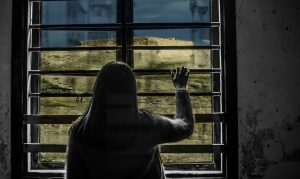Arad is one of the many Israeli cities that is both ancient and modern. This ancient city is mentioned in the Bible. Numbers 21:1 tells of the king of the southern Canaanite city of Arad who attacked Israelites making their way from Egypt to the Promised Land, and captured some of them. In all likelihood, biblical Arad is identical to the one uncovered by Israeli archeologists in the 1960s, known today as Tel Arad, or Old Arad. Its upper hill holds the only ever discovered ‘House of Yahweh’ in the land of Israel: the incense altars and two ‘standing stones’ are the remainders of an ancient temple to the God of Israel.
 Both the hill and the lower city are a part of the Tel Arad National Park, which, incidentally, hosts open-air Shabbat services of a local Messianic congregation. Tel Arad is located a few kilometers from present-day Arad, where these locals live, and borders both the Judean Desert and the Negev Desert. For most of the year, the weather is very dry and very hot. Why, then, would these Messianic Jews board a bus on the Sabbath, traveling away from the city and gathering in the open air instead of in a comfortable, air-conditioned facility close to their homes? The answer: There is a battle raging in Arad, this time not between an idol-worshipping Canaanite king against God’s people, but between two different groups of Yahweh-worshipping Jews: Orthodox Jews versus Messianic Jews.
Both the hill and the lower city are a part of the Tel Arad National Park, which, incidentally, hosts open-air Shabbat services of a local Messianic congregation. Tel Arad is located a few kilometers from present-day Arad, where these locals live, and borders both the Judean Desert and the Negev Desert. For most of the year, the weather is very dry and very hot. Why, then, would these Messianic Jews board a bus on the Sabbath, traveling away from the city and gathering in the open air instead of in a comfortable, air-conditioned facility close to their homes? The answer: There is a battle raging in Arad, this time not between an idol-worshipping Canaanite king against God’s people, but between two different groups of Yahweh-worshipping Jews: Orthodox Jews versus Messianic Jews.
Following many years of persecution and harassment by the Orthodox, this Messianic Jewish congregation in Arad, led by Yoyakim Figueras, made the decision to hold their Sabbath meetings beyond the reach of the Orthodox Jews, who are prohibited from driving on the Sabbath and from walking more than a certain ‘Sabbath distance’.
How would the battle look had the congregation chosen to continue meeting inside the city? It might be similar to the meetings of the city’s Russian-language Messianic congregation, Peleg Elohim (“Stream of God” in Hebrew, taken from Ps. 65). This congregation is led by my good friend Shimon Pliner.
Let me describe the battle the people of Peleg Elohim face each week.
As you approach their place of meeting, a group of Orthodox Jews will greet you at the entrance. They will tell you that “Yeshu” – a derogatory Hebrew acronym for Jesus – is not for the Jews, that you are about to enter a place of idolatry, that the worshippers claim they are Jews, while in reality they are Christians. And of course they will pray that God keep you from the harm which endangers your soul as you enter the facility.
 If this occurs on a Shabbat, the group will be relatively quiet, out of respect for the sanctity of the holy day. However, if you come to a prayer meeting in the middle of the week, say, on a Wednesday evening, the representatives of the Arad Orthodox community will shout, pound on the door and the walls, and their deafening singing will muffle the worship, overwhelming the small congregation and invading the simple space. As you sit inside and listen to all that is going on outside, you are likely to feel uneasy, insecure, intimidated and threatened. You may think, “This noise and pressure are unbearable, isn’t it better to just leave immediately and never come back here? Can’t I pray at home?” That is precisely the goal of these demonstrators. If you endure to the end of the congregation’s meeting and open the door to leave at around 8 P.M., you will most likely be blinded by the flash of a camera as someone takes your picture. You may also be followed home, only to receive an unexpected visit a few days later from a member of the Orthodox community, who will try to dissuade you from attending the meetings.
If this occurs on a Shabbat, the group will be relatively quiet, out of respect for the sanctity of the holy day. However, if you come to a prayer meeting in the middle of the week, say, on a Wednesday evening, the representatives of the Arad Orthodox community will shout, pound on the door and the walls, and their deafening singing will muffle the worship, overwhelming the small congregation and invading the simple space. As you sit inside and listen to all that is going on outside, you are likely to feel uneasy, insecure, intimidated and threatened. You may think, “This noise and pressure are unbearable, isn’t it better to just leave immediately and never come back here? Can’t I pray at home?” That is precisely the goal of these demonstrators. If you endure to the end of the congregation’s meeting and open the door to leave at around 8 P.M., you will most likely be blinded by the flash of a camera as someone takes your picture. You may also be followed home, only to receive an unexpected visit a few days later from a member of the Orthodox community, who will try to dissuade you from attending the meetings.
Following the principle of smiting the shepherd in order to scatter the sheep, the Orthodox demonstrators will focus on the congregation’s leader: “Your Shimon is a brawler. He does not pay taxes. He is a deceiver, dripping with practiced sincerity, who only wants your money and doesn’t care for you one bit”. Needless to say, none of that is remotely true. The repeated investigations of the tax police stirred by these accusations proved their falseness time and again. Shimon is a wonderful husband and father. He and his wife have secular jobs and do not need any financial support from the congregation that loves them very much. Indeed, Shimon’s love reaches beyond the congregation to his persecutors, some of whom are greatly disturbed by his kindness – a thing they never expected in return for their vicious attacks. But, according to Orthodox Jewish logic, since he preaches lies, it is acceptable to spread lies about him. Shimon’s photo can be found on bulletin boards around the city, together with a warning for citizens to avoid this “dangerous deceiver and missionary”. Flyers with the same content are distributed to mail boxes and tucked under windshield wipers.
However, faith-filled prayer is a mighty spiritual weapon. Please pray for Yoyakim, for Shimon and for their people to be strengthened, and not intimidated. Pray that the people in the region will be drawn to the message they are preaching. Pray for the Orthodox community to come to know their Messiah, and for the authorities to take a stand for facts and against lies. Let us stand with our brothers and sisters in prayer as they stand for God in Arad!
Alec Goldberg